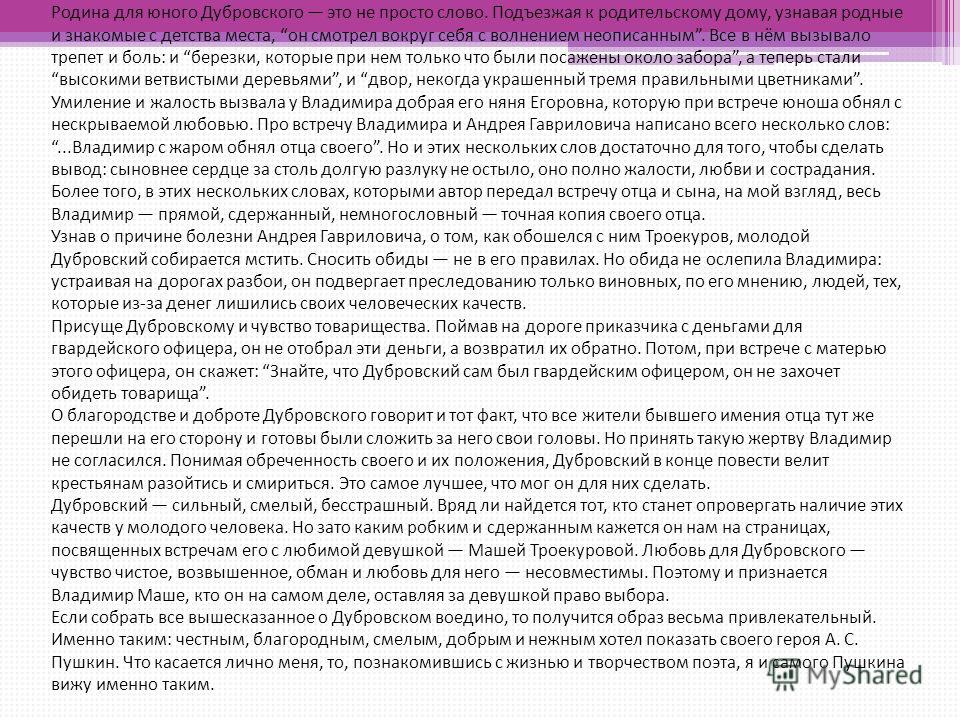Character characteristic. Vladimir Dubrovsky.. Appearance. Speech. "Age 23 years old, medium height, clean face, shaves his beard, has brown eyes, hair. - presentation
Appearance. Speech. "He is 23 years old, of medium height, his face is clean, he shaves his beard, his eyes are brown, his hair is blond, his nose is straight. Special signs: there were none." Gather with all the strength of your soul, beg your father, throw yourself at his feet: imagine to him all the horror of the future, your youth, fading near a frail and depraved old man - decide on a cruel explanation; say that if he remains implacable, then ... then you will find terrible protection ... say that wealth will not bring you a single moment of happiness; luxury comforts only poverty, and then out of habit for a moment; do not lag behind him, do not be afraid of either his anger or threats - as long as there is even a shadow of hope, for God's sake, do not lag behind. If there is no other way ... military posture, served in the guards, had "luxurious whims", smoked a pipe (Chapter III); "sonorous voice", "majestic appearance" (Chapter V); "pleasant appearance", "simple manner", "loaded pistol" in the pocket (Chapter VIII); "he was a curly blond boy" (Chapter IX); "appearance that reveals strength" (chapter X); "in a military overcoat and in a white cap" (Chapter XI).
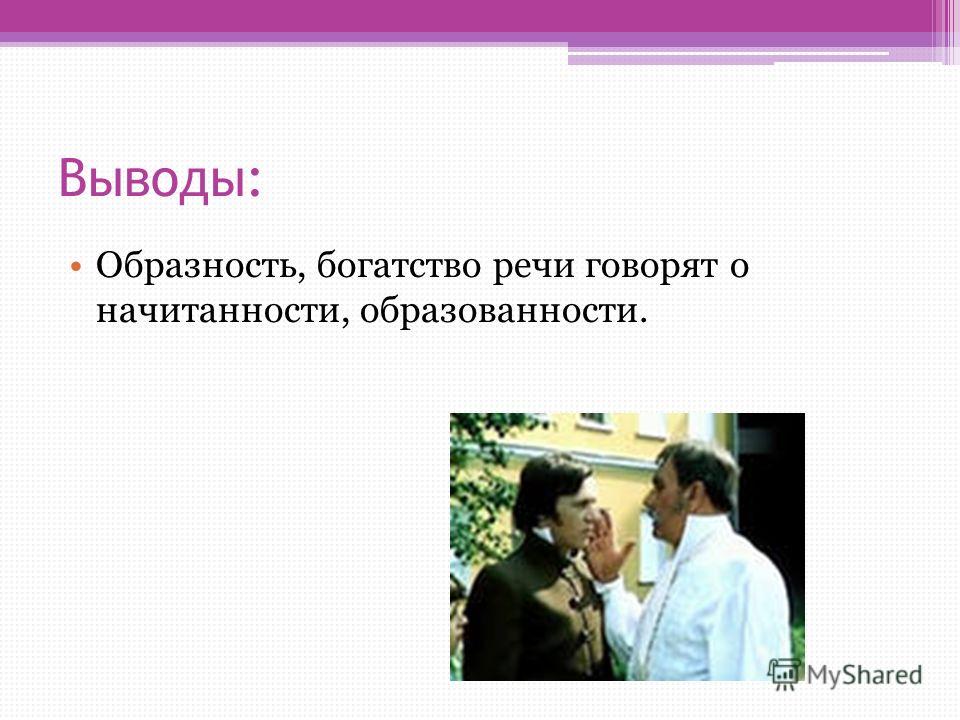
Typical character traits are the result of upbringing in the family, then in the team. What do we know about Vladimir's upbringing? What is his background? He lost his mother from childhood and, almost not knowing his father, was brought to St. Petersburg at the 8th year of his age - with all that, he was romantically attached to him, and the more he loved family life, the less he had time to enjoy its quiet joys . Vladimir Dubrovsky was brought up in the Cadet Corps and was released as a cornet in the guard; his father spared nothing for his decent maintenance, and the young man received from the house more than he should have expected. Being extravagant and ambitious, he allowed himself luxurious whims; played cards and went into debt, not worrying about the future, and foreseeing sooner or later a rich bride, the dream of a poor youth.
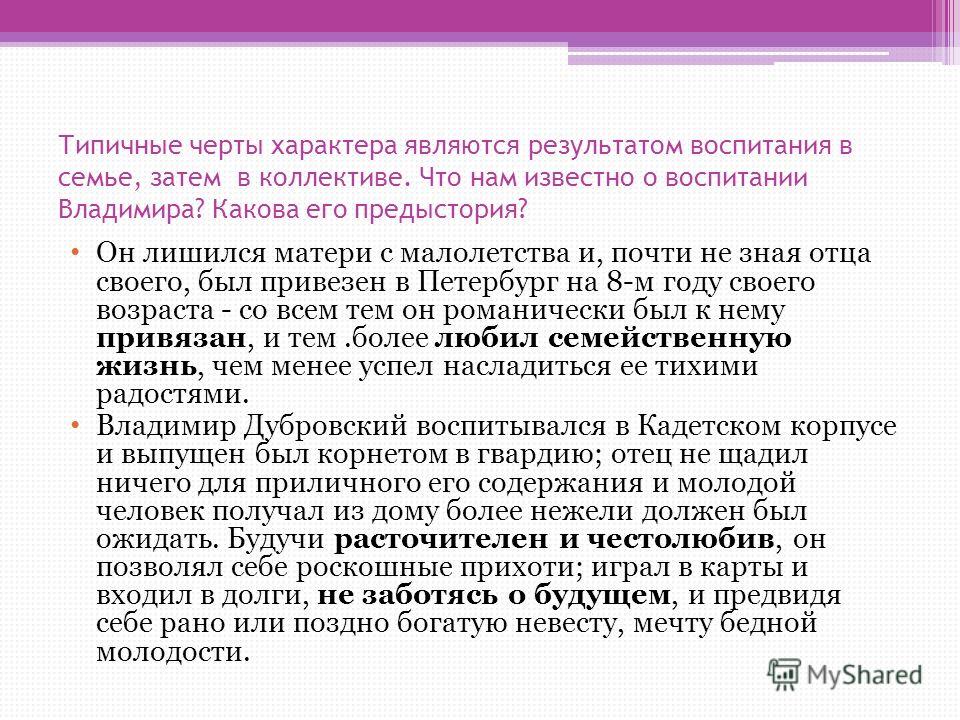
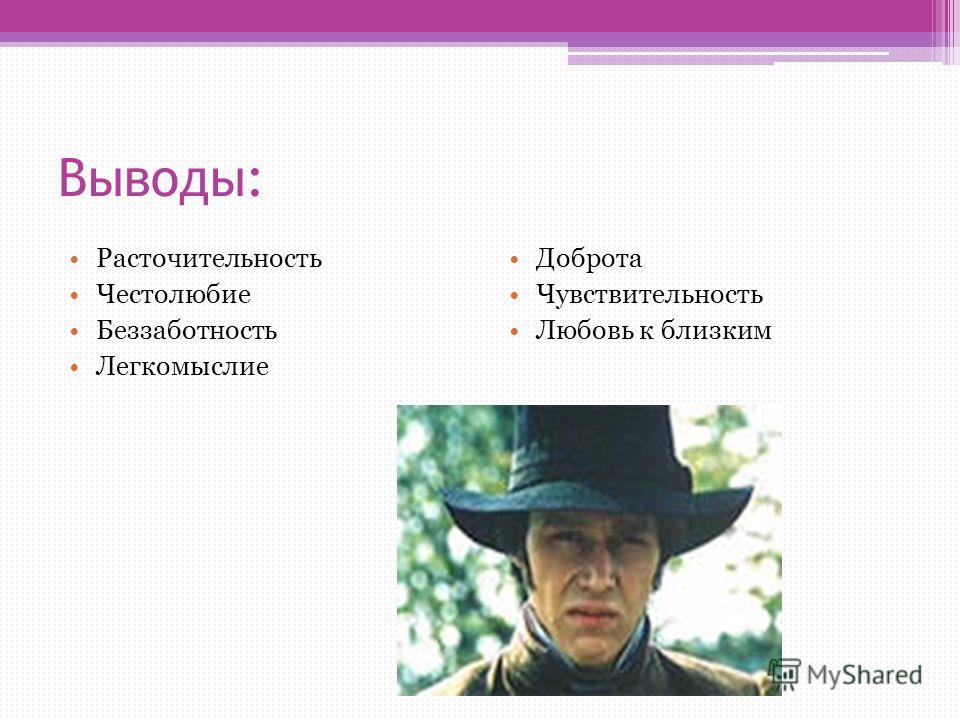
A person is not alone in the world, he lives in society and constantly comes into contact with other people, therefore other people constantly enter the mental world of each of us, occupy a certain place there, create a good or bad mood for us. How does the character of Dubrovsky manifest itself in relationships with others? People close, loved (attitude to love) Servants. Enemies
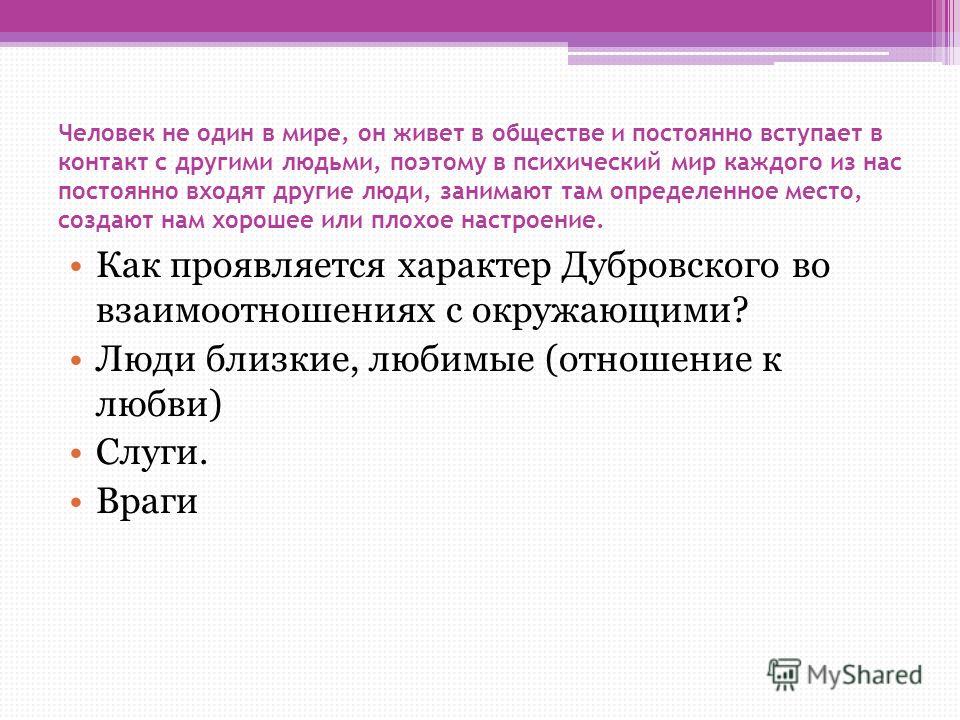
Relationship with loved ones. The thought of losing his father painfully tormented his heart, and the situation of the poor patient, which he guessed from the letter of his nurse, horrified him. Vladimir reproached himself for criminal negligence. For a long time he did not receive letters from his father and did not think about inquiring about him, believing him to be on the road or on household chores. He decided to go to him and even retire, if his father's ill state required his presence. Vladimir foresaw its imminent destruction and did not leave the old man ... Know that he was born for a different purpose, that his soul knew how to love you - I would give my life for you, to see you from afar, to touch your hand was rapture for me.
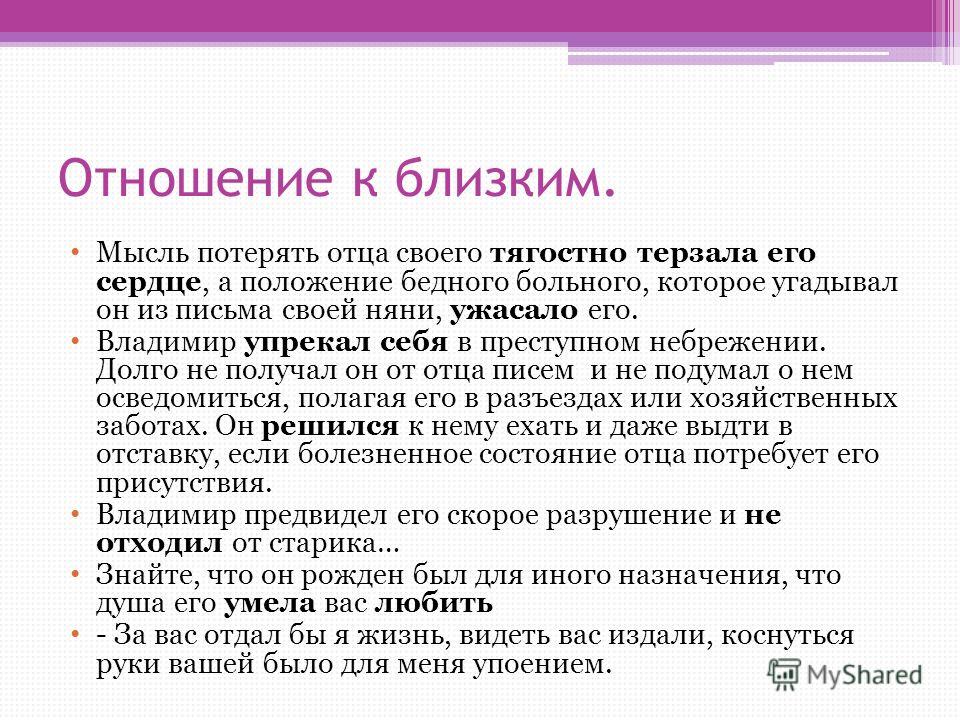
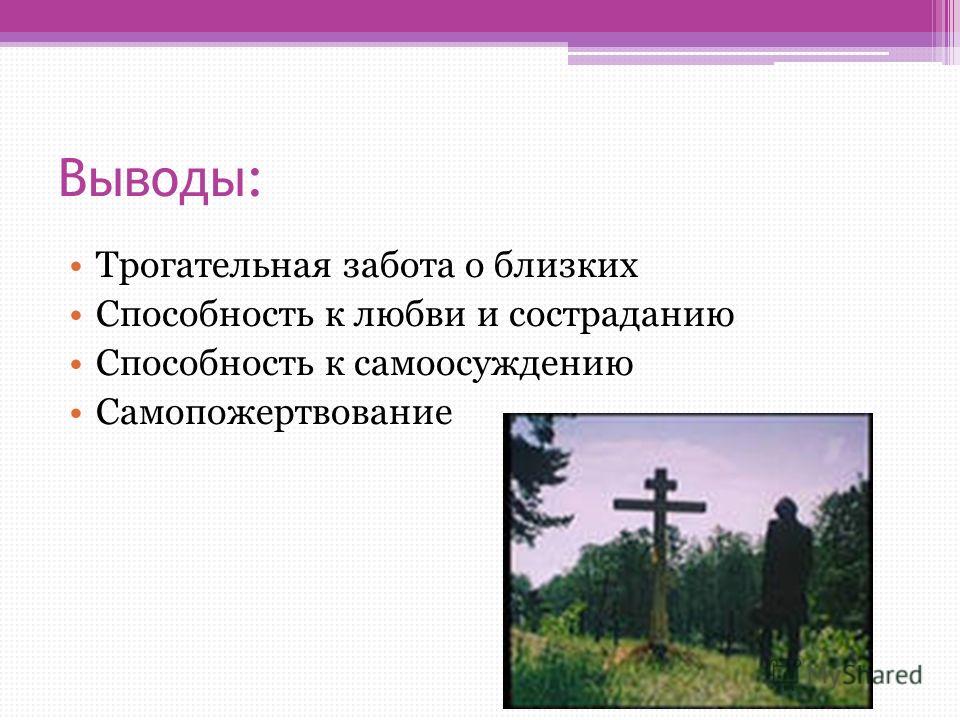
Attitude towards the servants Touched by the devotion of the old coachman, Dubrovsky fell silent - and again indulged in reflections. Yegorovna embraced her pupil with tears. “Great, great, nanny,” he repeated, pressing the good old woman to his heart, “what’s up, father, where is he?” what is he? Guys, knit? - shouted the same voice, - and the crowd began to push ... - Stop, - Dubrovsky shouted. - Fools! what are you? you are destroying yourself and me. “Go out into the yards and leave me alone. Do not be afraid, the sovereign is merciful, I will ask him. He won't hurt us. We are all his children. And how will he intercede for you if you begin to rebel and rob. The speech of the young Dubrovsky, his sonorous voice and majestic appearance produced the desired effect. The people calmed down, dispersed Go, bring her here, and take all our people out of the house so that not a single soul remains in it. You have become rich under my command, each of you has an air with which he can safely get into some remote province and there to spend the rest of his life in honest labor and in abundance. But you are all scammers and you probably won't want to leave your craft.
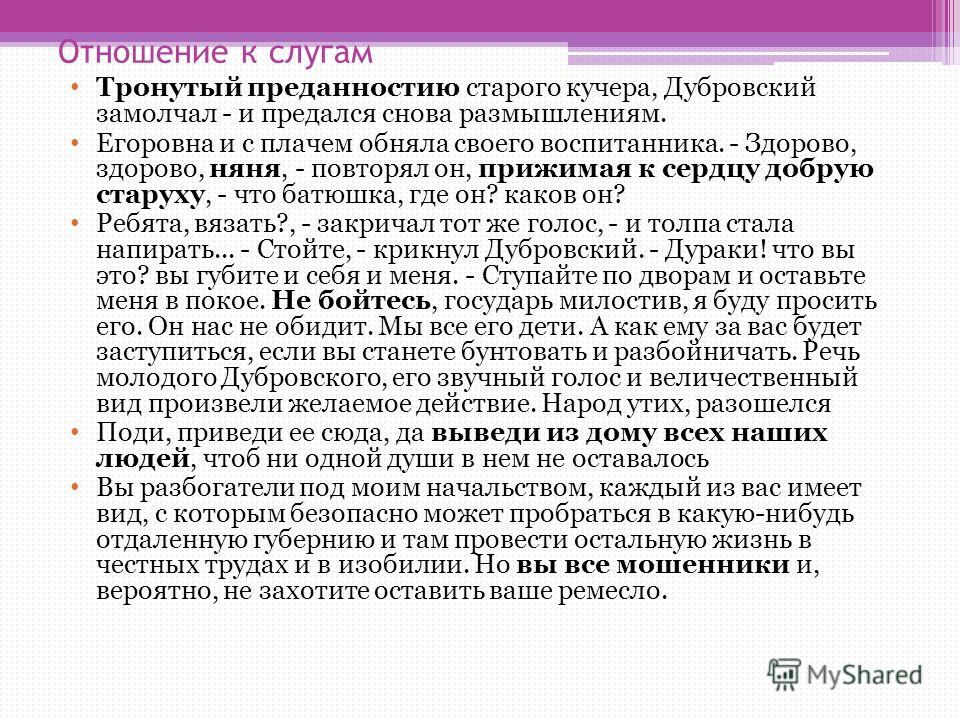
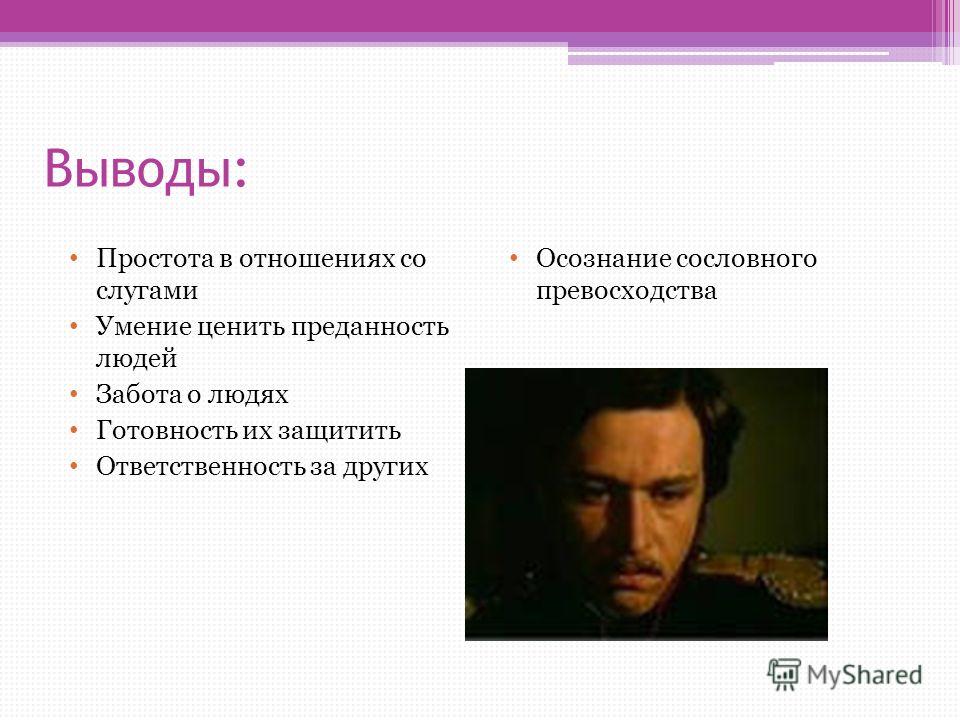
Attitude towards enemies. - Guys, knit?, - shouted the same voice, - and the crowd began to push ... - Stop, - Dubrovsky shouted. - Fools! what are you? you are destroying yourself and me. you didn't do the job. Not the clerks are to blame. Light your lantern, follow me. “Wait a minute,” he said to Arkhip, “it seems that in my haste I locked the doors to the front room, go ahead and unlock them.” I will not touch him, your will is sacred to me. He owes you his life. I forgave him. Look, you saved him. everyone drove off to the side, leaving the carriage in the middle of the road, people tied up, horses harnessed, but without plundering anything and without shedding a single drop of blood, in vengeance for the blood of their chieftain.
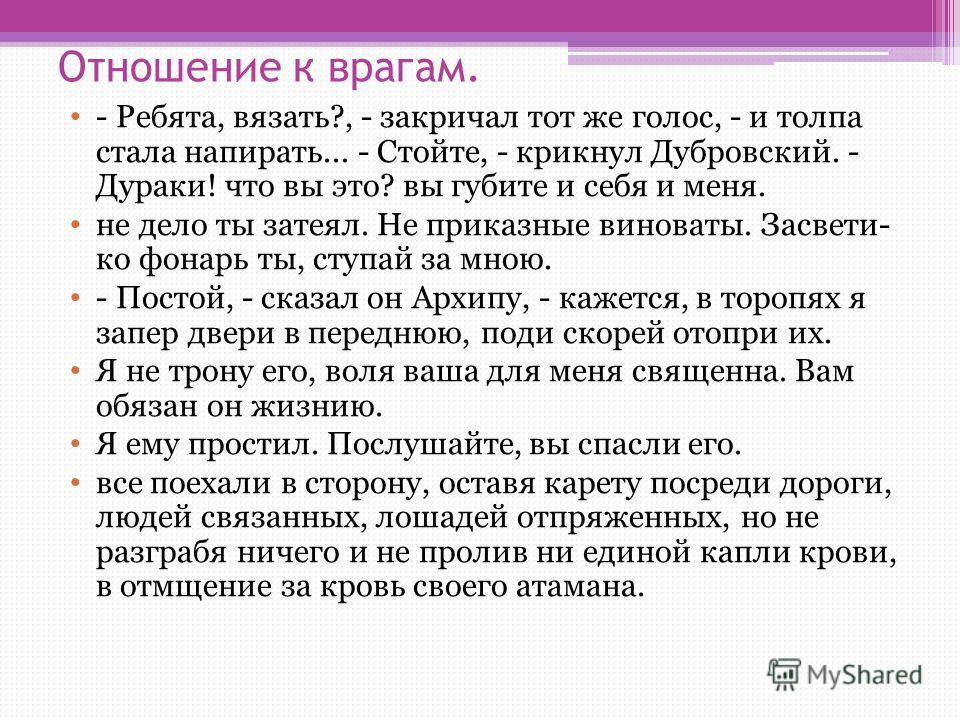
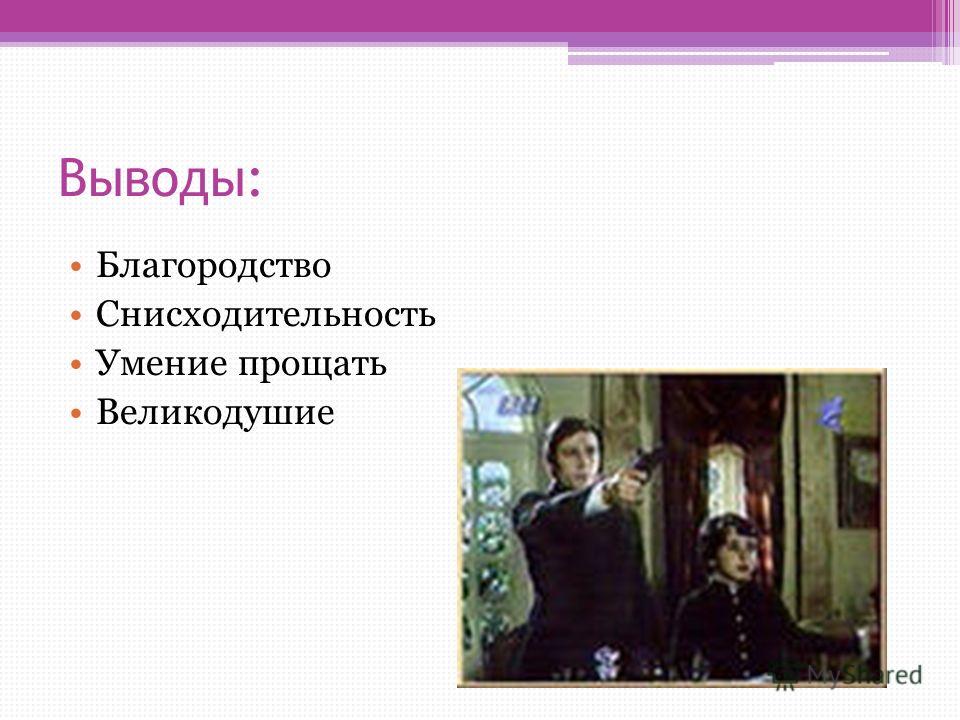
The character of a person is shown in his actions. What actions does Dubrovsky perform and how do they characterize him? Vladimir clenched his teeth - terrible thoughts were born in his mind. The Frenchman was not embarrassed, did not run, and waited for the attack. The bear approached, Deforge took a pistol from his pocket, put it in the hungry beast's ear and fired. The bear fell. Everyone rushed in, the doors opened, Kirila Petrovich entered, amazed at the denouement of his joke. Kirila Petrovich certainly wanted an explanation of the whole matter - who had anticipated Deforge about the joke prepared for him, or why he had a loaded pistol in his pocket. He sent for Masha, Masha came running and translated her father's questions to the Frenchman. - I have not heard of a bear, - answered Desforges, - but I always carry pistols with me, because I do not intend to endure an insult, for which, in my rank, I cannot demand satisfaction.
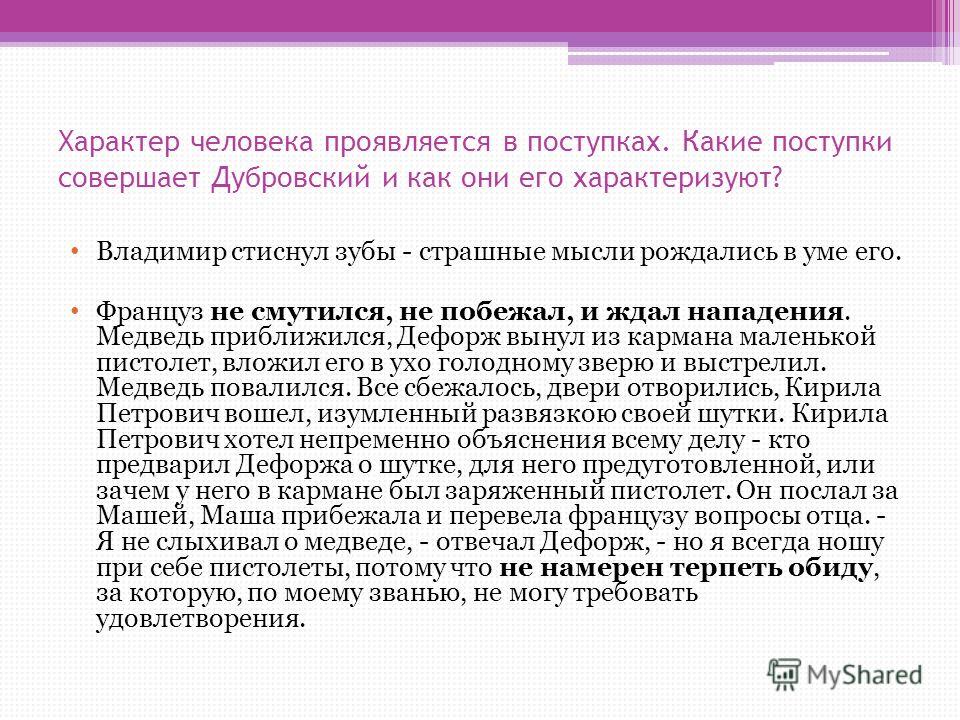
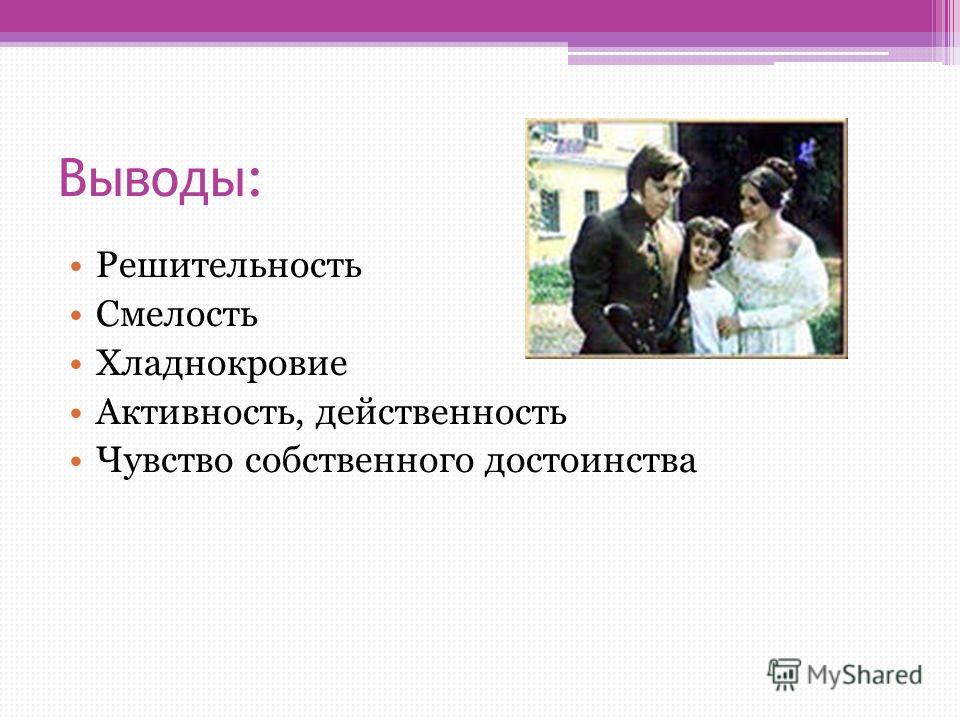
The character of a person is manifested in relations with the environment. How does Pechorin relate to nature and his home? his heart began to beat; before him he saw Kistenevka and his father's poor house. Vladimir stopped, sat down on the cold turf, and one thought more gloomy than the other became shy in his soul... He strongly felt his loneliness. The future for him was covered with menacing clouds. The enmity with Troekurov foreshadowed new misfortunes for him. His poor property could depart from him into the wrong hands - in this case, poverty awaited him. For a long time he sat motionless in the same place, gazing at the quiet current of the stream, carrying away a few faded leaves - and vividly presenting to him a true semblance of life - a semblance so ordinary.
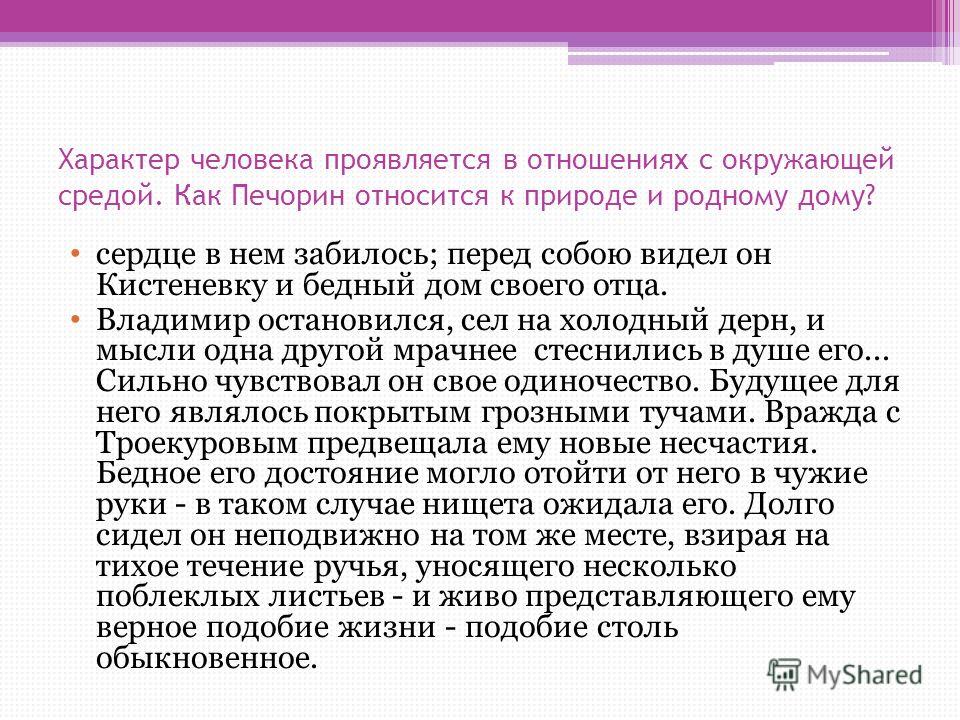
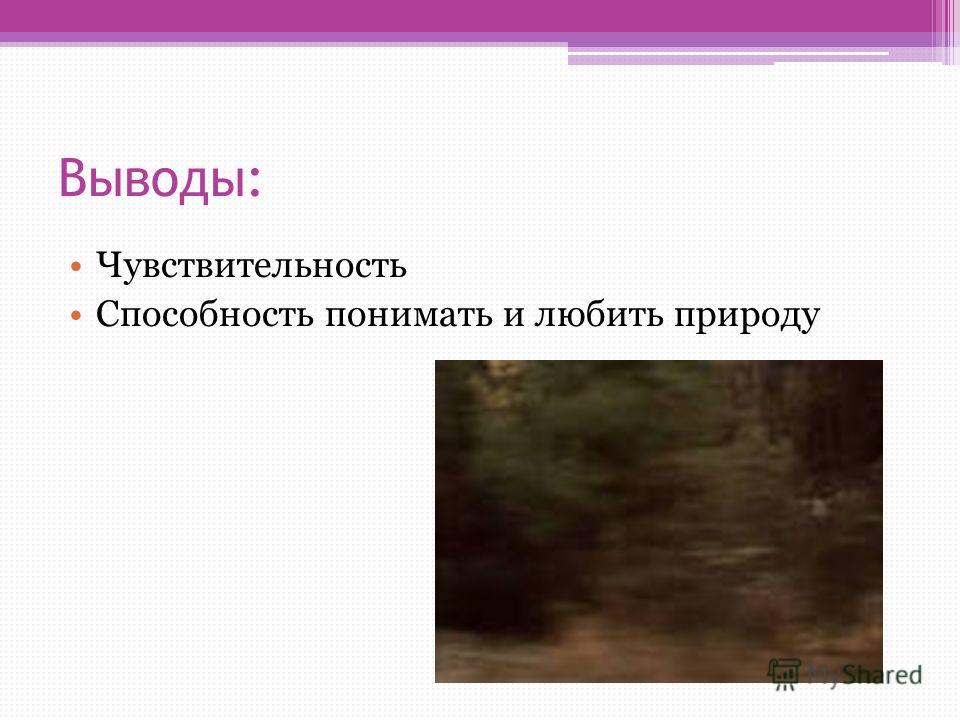
Characteristics plan of the character of a literary work 1. Introduction. The place of the character in the work (main, secondary). 2. Origin, social status. 3. Features of the portrait (manner, appearance, clothing). 4. The speech of the character. 5. Actions, behavior, influence on others. 6. Relationships with other actors. 7.Author's attitude to the hero. 8. Your feelings and thoughts related to the experience of the character's fate.
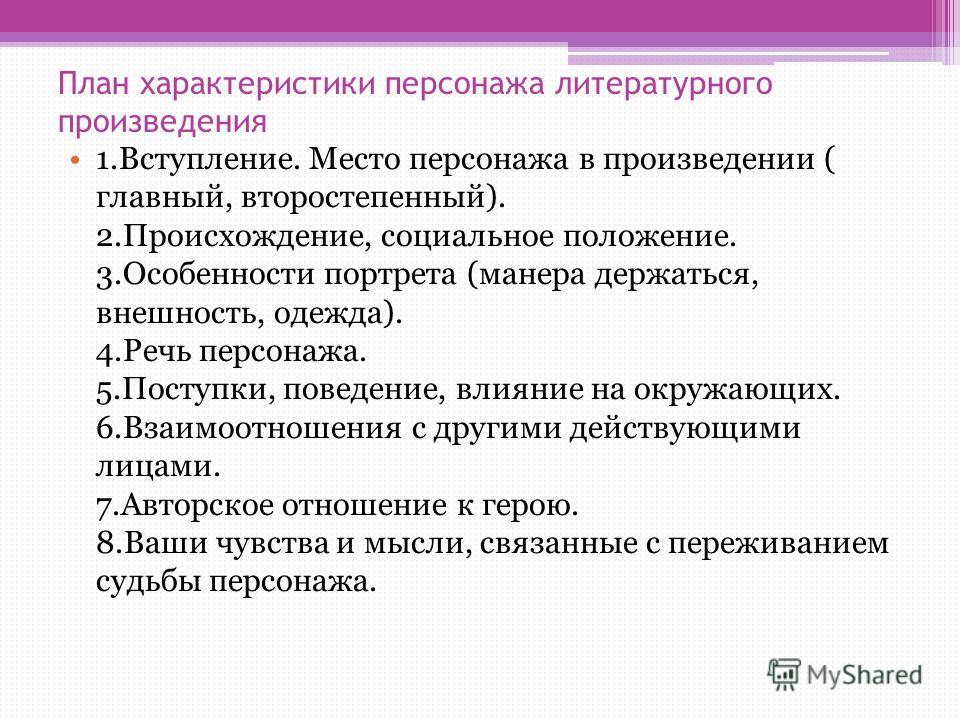
The image of Vladimir Dubrovsky in A. S. Pushkin's story "Dubrovsky" In our first acquaintance with Vladimir Dubrovsky, we see a young, confident in himself and his future nobleman, a guards cornet, who rarely thinks about where the money comes from and how much he has there is a father. Vladimir never faced the problem of lack of money, because, being the only son of his father, although far from being a wealthy nobleman, he received from the house more than he should have expected. And, you know, if money comes easily, then it is very easy to part with it. So it was with Vladimir: He allowed himself luxurious whims, played cards and entered into debt, not caring about the future and foreseeing sooner or later a rich bride, the dream of poor youth. In a word, the heir of Andrei Gavrilovich Dubrovsky, on our first acquaintance with him, seemed to us not at all outstanding, the young man was characterized by all those pranks and deeds that, without hesitation, can be attributed to almost all young people of his age and class. Reading about the idle pastime of young Vladimir among his friends, you imagine, looking ahead, this young man in the near future, a kind of self-satisfied, deaf to other people's troubles, and sometimes a cruel gentleman like Kirila Petrovich Troekurov. But very soon you begin to understand that these ideas were false, because Vladimir Dubrovsky is the real son of his father: just as honest, fair, decent. The time spent in the cadet corps did not in the least affect the noble qualities innate and laid down by the father in childhood. Having learned about the illness of Andrei Gavrilovich, the son, without a moment's hesitation, goes to him on the estate. He reproaches himself very much for the fact that, having not received a letter from his parent for a long time, he himself did not bother to inquire about his health.
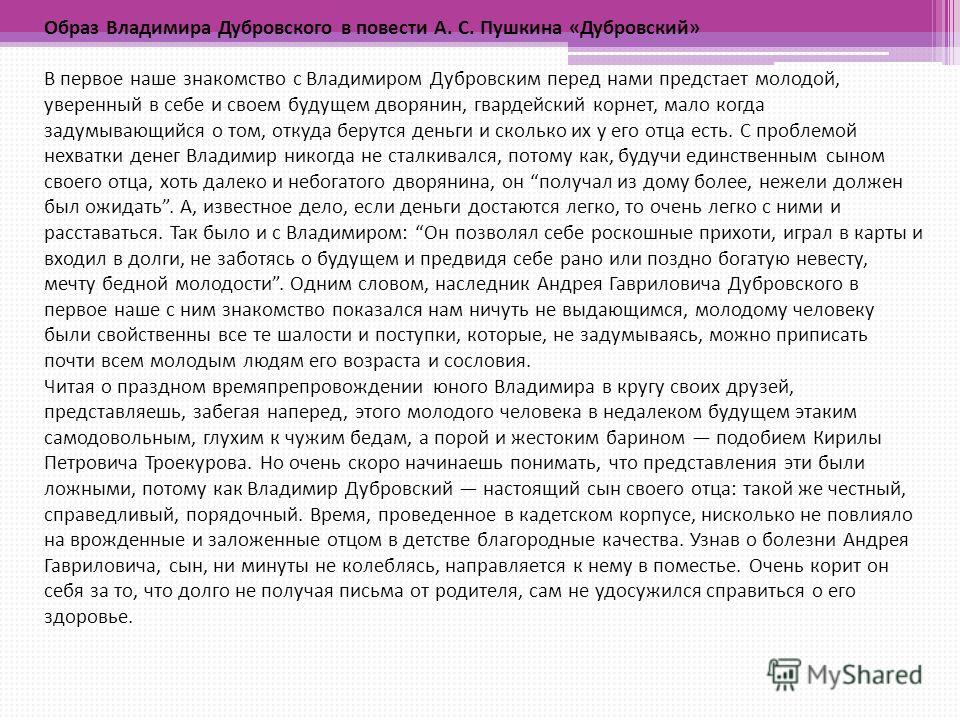
Homeland for young Dubrovsky is not just a word. Approaching his parents' house, recognizing his native and familiar places from childhood, he looked around him with indescribable excitement. Everything in him caused awe and pain: both the birch trees that had just been planted near the fence under him, and now they have become tall branched trees, and the yard, once decorated with three regular flower beds. Egorovna, his kind nanny, evoked tenderness and pity in Vladimir, whom the young man embraced with undisguised love at the meeting. Only a few words have been written about the meeting between Vladimir and Andrey Gavrilovich: ... Vladimir warmly embraced his father. But even these few words are enough to draw a conclusion: the filial heart has not cooled down for such a long separation, it is full of pity, love and compassion. Moreover, in these few words, in which the author conveyed the meeting between father and son, in my opinion, the whole of Vladimir is a direct, restrained, laconic exact copy of his father. Having learned about the cause of Andrei Gavrilovich's illness, about how Troekurov treated him, young Dubrovsky is going to take revenge. To bear grievances is not in his rules. But resentment did not blind Vladimir: arranging robberies on the roads, he prosecutes only the guilty, in his opinion, people, those who, because of money, have lost their human qualities. Dubrovsky is also characterized by a sense of camaraderie. Having caught a clerk on the road with money for a guards officer, he did not take this money away, but returned it back. Then, when meeting with the mother of this officer, he will say: Know that Dubrovsky himself was a guards officer, he will not want to offend his comrade. The nobility and kindness of Dubrovsky is also evidenced by the fact that all the inhabitants of the former estate of his father immediately went over to his side and were ready to lay down their lives for him. But Vladimir did not agree to accept such a sacrifice. Realizing the doom of his and their situation, Dubrovsky at the end of the story tells the peasants to disperse and reconcile. This is the best thing he could do for them. Dubrovsky is strong, brave, fearless. It is unlikely that there will be someone who will refute the presence of these qualities in a young man. But on the other hand, how timid and reserved he seems to us on the pages devoted to his meetings with his beloved girl Masha Troekurova. Love for Dubrovsky is a pure, sublime feeling; deceit and love are incompatible for him. Therefore, Vladimir Masha admits who he really is, leaving the girl the right to choose. If we collect all of the above about Dubrovsky together, we get a very attractive image. Just like this: honest, noble, courageous, kind and gentle, A. S. Pushkin wanted to show his hero. As for me personally, having become acquainted with the life and work of the poet, I see Pushkin himself as such.
